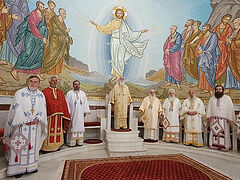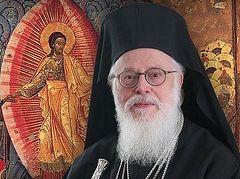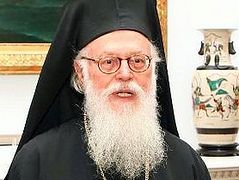Athens, January 25, 2025
His Beatitude Archbishop Anastasios of Tirana, Durrës, and All Albania reposed in the Lord this morning at the age of 95.
The Albanian primate, known as a missionary hierarch in Africa and the restorer of the Albanian Church from ruin, had been hospitalized since December 30, initially in Tirana, and then in Athens, where he underwent surgery and later fell into a coma.
In recent years, he proved himself a defender of Orthodoxy on the ecclesiastical issue in Ukraine, standing with the canonical Ukrainian Orthodox Church.
The Albanian Orthodox Church announces:
The Orthodox Autocephalous Church of Albania, with the deepest of sorrow, announces the falling asleep in the Lord of His Beatitude, Archbishop Anastasios of Tirana, Durres, and All Albania. His Beatitude fell asleep in the Lord today, January 25, 2025, at 08:30 AM, at the age of 95, at Evangelismos Hospital in Athens, due to multiple organ failure, following a prolonged hospitalization at Hygeia Hospital in Tirana.
We call upon the faithful of the Church of Albania *(and throughout the world)* to pray for the repose of the soul of our departed Primate.
The indelible Archbishop Anastasios restored and renewed of the Orthodox Autocephalous Church of Albania, which he raised from its ruins following the fall of the atheistic regime. Through his God-inspired vision and tireless labor, he rebuilt ecclesiastical life from its very foundations, erected hundreds of churches, established educational and philanthropic institutions, and educated and ordained new clergy, offering unceasing sacrificial service for over thirty-three years.
May his memory be eternal!
***
Abp. Anastasios was born in Piraeus on April 11, 1929. He received his degree from the Theological School of the University of Athens with honors in 1952.
He continued postgraduate studies in Religious Studies, Ethnology, Missiology, and African Studies at the Universities of Hamburg and Marburg, Germany (1965-69), as a scholar of the German Alexander von Humboldt Foundation.
He was proclaimed Doctor of the Theological School of the University of Athens in 1970, again with special distinction.
He served in the military from 1952 to 1954.
Besides his native and ancient Greek, English, French, German, and Albanian, he also had knowledge of Latin, Spanish, Italian, Russian, Swahili. He studied various religions (African religions, Hinduism, Buddhism, Taoism, Confucianism, Islam) in the countries where they flourish (Kenya, Uganda, Tanzania, Nigeria, India, Thailand, Ceylon, Korea, Japan, China, Brazil, Caribbean, Lebanon, Syria, Egypt, Turkey, etc.).
Church ministry
As a lay theologian in Greece (1952-60) he worked in various areas of internal mission (preaching, Christian writing, catechism, organizing Bible study circles, youth and student camps).
He pioneered the revival of Orthodox external mission (1959), published the first missionary journal “Porefthentes” in Greek and English, and founded the Inter-Orthodox Missionary Center of the same name.
He became a monk at the Holy Monastery of Asomaton-Petraki on August 1, 1960. He was ordained a hierodeacon on August 7, 1960, hieromonk with the rank of archimandrite on May 24, 1964, and Titular Bishop of Androusis on November 19, 1972, with the position of General Director of the Apostolic Diakonia of the Church of Greece.
Under the direction of the Holy Synod of the Church of Greece, he wrote three Catechetical Aids for teachers in the Middle Catechetical Schools of the Church of Greece.
During his studies in Germany, he served as priest for Greek workers and students there.
As General Director of Apostolic Diakonia, he promoted various theological, educational, construction and publishing programs of the Church.
He mobilized the relevant authorities of the Ministry of Culture and the Holy Metropolises of Greece for the recording of the Church’s heirloom property.
He particularly developed the external mission sector with continuous support to missionary teams in Korea, India, Africa and with the organization of External Mission Week.
He initially traveled to Africa in May-July 1964 to Uganda, Tanzania and Kenya investigating the possibilities for systematic Orthodox mission.
In the summer and fall of 1967, he conducted religious research on traditional religiosity in Uganda. In the decade 1981-1991, as Patriarchal Vicar of the Holy Metropolis of Irenopolis-East Africa (Kenya, Uganda, Tanzania), he founded and organized the Patriarchal Archbishop Makarios of Cyprus School, which he directed for a decade.
He ordained 62 African clergy and appointed 42 readers-catechists from eight African tribes (including the first four Tanzanian clergy); simultaneously he promoted translations of the Divine Liturgy into 4 African languages.
He oversaw the stabilization of approximately 150 Orthodox parishes and parishes and the construction of dozens of churches; built seven missionary stations, and arranged for the creation of schools and medical stations. He was recognized as “Great Benefactor” of the Patriarchate of Alexandria (2009).
His ecclesiastical work culminated in the mission requested by the Ecumenical Patriarchate to rebuild the Orthodox Autocephalous Church of Albania from ruins, which had collapsed after 46 years of persecution under the world’s only “atheist state.” He initially worked as Patriarchal Exarch from January 1991 to June 1992.
He was elevated to Metropolitan of Androusis (August 1991 to June 1992) and elected Archbishop of Tirana and all Albania on June 24, 1992.
Amid enormous difficulties, he managed to reconstruct the Autocephalous Church of Albania from the ground up: He developed a new Constitutional Charter (2006); through an official agreement with the Government of Albania, which became state law (2009), the relations between Church and state were defined.
Over 400 parishes were established. He founded the Anastasis Theological-Hieratic School (Academy) in Durrës in 1992, the Holy Cross Ecclesiastical Lyceum in Gjirokastër in 1998, and in Sukth-Durrës (2007-18), and the School of Byzantine Music in Tirana in 2012. He educated and ordained 168 new clergy.
He established youth centers in various cities. He arranged for translation efforts, the publication of liturgical and other religious books.
He established the Church’s Technical Service and oversaw the construction of 150 new churches (large and small), restored 60 churches and monasteries-cultural monuments and repaired 160 churches and 70 ecclesiastical buildings for schools, youth centers, health centers, hostels, workshops, soup kitchens for the poor, and so on—in total 450 buildings. He developed the Church’s charitable care, with distribution of hundreds of tons of food, clothing, medicines.
He founded the first Orthodox Albanian newspaper Ngjallja (Anastasis) in 1992, the children’s magazine Gëzohu (Rejoice) in 1997, the youth magazine Kambanat (Bells), the scientific review Kërkim (Research) in 2009, the newsletter “News from Orthodoxy in Albania” (1996-2002), as well as Radio-Ngjallja in 1997.
He arranged for the creation of Church Workshops (printing press, candle-making, carpentry, iconography and icon restoration workshops). He fought for the reclamation of Church property.
Parallel to the reconstitution of the Orthodox Church, he developed pioneering programs in the areas of education, health, social welfare, agricultural development, culture and ecology.
He founded the Evangelismos Orthodox Clinic (Diagnostic Medical Center) with 24 specialties and three medical centers in other cities; also the Institute of Professional Training, with six specialties in Tirana and four specialties in Gjirokastër (which operated from 1998-2008).
This was subsequently upgraded to the Logos University in 2009. He also founded several other kindergartens, schools, and boarding schools. He arranged for the construction of roads, aqueducts, bridges, the repair of public schools, etc.
During the period 2013-2019, three hydroelectric projects with a total capacity of 19 MW were constructed (Librazhd, Llenge, Sllabinja), which contribute to strengthening the country’s infrastructure and have a clear social purpose.
With its revenues, the Orthodox Autocephalous Church of Albania continued its spiritual, charitable and educational efforts. After the repayment of loans, a percentage was allocated to poorer Orthodox churches.
With all these initiatives, thousands of people were given employment, serious social infrastructure works were created, and the Orthodox Church of Albania emerged as a multi-powered spiritual and developmental factor.
The Archbishop was also a founding member and at times President of the Interconfessional Biblical Society of Albania (2009-) and of the Interreligious Council of Albania (2007-), which was honored by the President of the Republic with the highest decoration “Nderi i Kombit” (Honor of the Nation) (2021). During the Kosovo crisis (1999), he organized an extensive humanitarian program that helped approximately 33,000 refugees in various parts of Albania.
He connected the Church of Albania with international Church Organizations. During the tension between Greece and Albania, he contributed to its de-escalation and the rapprochement of the two countries. Simultaneously, he fought for the reduction of antagonisms in the Balkans.
In 2000, following a proposal by 33 Academics of the Academy of Athens and many personalities from Albania, he was nominated for the Nobel Peace Prize.
International inter-denominational activity
The Archbishop held numerous significant positions in international religious organizations, notably serving as Secretary-General of the Executive Committee for External Mission (1958-61), Vice President of the International Orthodox Youth Organization Syndesmos (1964-77), and President of the World Council of Churches (2006-2013).
He actively participated in major international religious conferences and assemblies since 1959, including World Mission and Evangelism Assemblies in Mexico, Bangkok, Melbourne, and San Antonio, as well as WCC Assemblies in Uppsala, Nairobi, Vancouver, Canberra, Harare, and Porto Alegre. Throughout his career, he served on various international committees focused on interfaith dialogue and mission studies, gave lectures at universities worldwide on Christian thought and interfaith dialogue, and held leadership positions in organizations like the European Council of Religious Leaders and the World Economic Forum's Council of 100 in Davos.
Academic life
The Archbishop also had a notable academic career:
- Taught Modern Greek language and literature at University of Marburg, Germany (1965-69)
- Professor of History of Religions at University of Athens (1972-76, then Full Professor 1976-92)
- Dean of the Theological School at University of Athens (1983-86)
- Director of Religious and Sociological Studies Division at University of Athens (1981-83)
Notable Institutional Leadership:
- Organized and directed the Center for Missionary Studies at University of Athens (1971-76)
- Organized and directed the Inter-Orthodox Center of Athens (1971-76)
- Corresponding Member of the Academy of Athens (1993-2005), later Honorary Member
Honorary Doctorates from prestigious institutions including: Religious/Theological:
- Holy Cross School of Theology (Brookline, USA)
- St. Vladimir’s Theological Seminary
- Moscow Theological Academy
- Pontifical Theological School of Southern Italy
- Fordham University
Secular:
- Boston University (Doctor of Humane Letters)
- University of Athens (multiple departments)
- University of Thessaloniki
- University of Patras
- University of Cyprus
He received honorary doctorates not just in theology but also in fields such as literature, philosophy, political science, medicine, and engineering, from Orthodox and western institutions.
He also held significant administrative roles beyond academia, including serving on the board of the Onassis Foundation (1994-2005) and various ecclesiastical and educational councils in Greece.
Written works
He has written and published 24 books (religious studies research, missionary essays, Orthodox spirituality) and more than 200 studies and articles of theological or religious content. His books and various texts have been translated into 17 languages. Throughout his long Orthodox witness, he combined theological knowledge and religious studies research with missionary and pastoral service, with social sensitivity and contribution.
His contribution to scholarship, contemporary Christian witness, inter-Christian rapprochement, interfaith dialogue, and peaceful coexistence of peoples and religions has been internationally recognized.
Awards and distinctions
His Beatitude received a number of awards and distinctions throughout his life, including from Sister Orthodox Churches and institutions:
- Patriarchate of Alexandria
- St. Catherine’s Monastery of Sinai
- Orthodox Church of Czechoslovakia
- Russian Orthodox Church
- Ecumenical Patriarchate
- Church of the Holy Sepulchre
- Church of Greece
- Church of Cyprus
- Serbian Orthodox Church
He also received extensive recognition from both academic institutions and governments. Academic honors included medals from the Academy of Athens and honorary citizenship from multiple universities.
His secular awards were particularly numerous, including high state decorations from Greece, Albania, Ukraine, Romania, and Poland. He received humanitarian awards like the Athenagoras Human Rights Award (New York), Pro Humanitate Award (Freiburg), and the Ecce Homo Polish humanitarian prize. He was also made honorary citizen of multiple cities in Greece and Albania, reflecting his work in both countries. His awards often recognized his contributions to peace, interfaith dialogue, and humanitarian work, particularly his role in rebuilding Albanian society and fostering Balkan cooperation.
Follow OrthoChristian on Twitter, Vkontakte, Telegram, WhatsApp, MeWe, and Gab!




